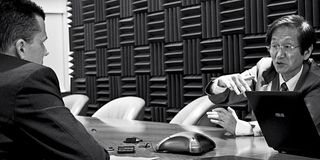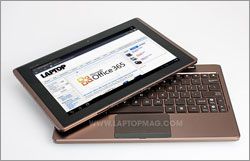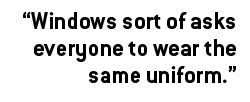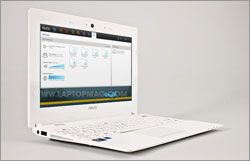Here's Jonney! ASUS' Chairman on Ultrabooks, the Amazon Threat, and What's Next for Tablets

If you ask Jonney Shih about what makes ASUS different, he'll tell you it's "design thinking." It means putting the needs of consumers ahead of specs, and the simple and ultra-affordable Eee PC crystallized that strategy. But as netbooks fall out of favor, Shih needs to generate more hit products like the original netbook to compete against not only Apple but a legion of Android competitiors. He's certainly not afraid to take risks--or tell you exactly what's on his mind.
We recently sat down with Shih to discuss his thoughts on Ultrabooks, Windows 8, the looming Amazon threat, and how he compares himself to Steve Jobs. Among the highlights:
- A thinner and more powerful Eee Pad Transformer 2 is on the way, likely with a quad-core Nvidia Kal-El chip.
- The UX21 is ASUS' way of combating the sameness of Windows, which Shih says "asks everyone to wear the same uniform"
- ASUS will likely start selling the very bold Padfone, which combines a phone and tablet in a single design, early next year.
- Windows Phone 7 Mango and Chrome OS are not in ASUS's plans.
LAPTOP: Between the Eee Pad Transformer and Slider, ASUS has two Android tablets that offer a physical keyboard. Why is that so important?

Jonney Shih: Most of us use tablets very casually. But today the web invites more input. And the traditional notebook isn’t very good for casual use. So we thought about the boundary between the notebook and the tablet. That’s why we have the Transformer to cover different kinds of scenarios. Next the Transformer 2 will come in, and it will be very thin and powerful.
L: Are you worried about Amazon as a competitor with its new tablet?
JS: I believe that Amazon has the advantage because of the content. I think they are also afraid that the eReader will be replaced by the more general-purpose tablet. Of course you need to worry, but we just need to keep driving more innovation. We are lucky that we already have good momentum. And we’re going to transfer that to the next generation of tablets.
L: Do you feel like you need to align yourself with a content partner in order to be more competitive?
Stay in the know with Laptop Mag
Get our in-depth reviews, helpful tips, great deals, and the biggest news stories delivered to your inbox.
JS: I’m not going to try to sell content, because content is just that. I think we have to measure what we can do the best. We put more emphasis on improving the user experience. So we will concentrate on other developments, like the workplace and giving users a personal cloud.
L: So is your upcoming Ultrabook an answer to the MacBook Air, tablets, or both?

JS: Windows sort of asks everyone to wear the same uniform. It’s a big uniform, so it’s difficult to drive the best user experience. With the UX21 we’re driving the beauty but also the responsiveness, how to make a 2-second instant on. You can see the metallic spun finish, the concentric circles. I think the audio quality and the instant on of the UX21 are important, because notebooks need to face the challenge from the tablet. When we had a meeting with Intel about this machine, they were very excited. I think they also had to think very hard [about] how to respond to the tablet.
L: What are your thoughts so far on Windows 8? It’s a pretty radical change for consumers.
JS: It’s a good thing that the whole industry is pretty shocked right now over this new operating system. Microsoft has done a lot of research. I think the tile interface is very compelling, especially for tablets. It’s a good approach. I still respect Microsoft because they have a lot of software expertise.
L: Do you think Windows 8 will work as well on notebooks as tablets?
JS: The tile-based interface is better for touchscreens. You need to consider a hybrid approach like the Eee Pad Transformer. Sometimes you need to use touch and other times the touchpad and keyboard. I think that’s because more and more people cannot separate entertainment and work.
L: Why haven't you adopted Chrome OS?
JS: Sometimes I think Chrome has the advantage. But I just don’t agree about restricting users only to web apps. The downloadable app is still evolving. Chrome will go more commercial, and that’s the right strategy. But the stateless concept is good. You drop a machine and you pick up another machine and you recover the state from the cloud. Microsoft should try to take this sort of advantage.
L: Do you still consider netbooks to be a viable product category?
JS: We have to be very sure that the netbook segment is more clearly defined that before. They still have a cost advantage. We’re also taking a more open approach with our X101. People can choose whether they want Android, MeeGo, or Windows. And of course you also have to improve the instant on, that kind of experience. But we’re going to keep an eye on Google and Chromebooks.

L: ASUS was criticized for churning out too many netbooks. Is there a similar risk for you in the tablet market with three different Android models?
JS: We actually learned some lessons from the Eee PC. You need to think harder and learn to be more selective and evolve that. Just-right segmentation is the key. We still like to provide a little more choice than Apple. For example, for people who like to have a keyboard, we’ll have a slider design. And for the 7-inch MeMo, we wanted to focus more on pen input. And you can see, compared with other 7-inch tablets, we purposely made the Pad narrower for one-hand use.
L: Your upcoming Padfone tries to marry the tablet and phone. Do you think consumers are ready for this kind of concept?
JS: A phone is great for checking e-mail very quickly, but when you really want to browse the web and watch video, you want to have the bigger screen. Why not consider this kind of concept? The tablet’s battery can also charge your phone up to five times. This is another kind of Transformer, and you can share the same SIM card for the data between the phone and tablet.
L: Will the carriers accept this type of product?
JS: I think this is natural, and the carriers need to confront that. You should pay by how much data you use.
L: When will the Padfone be available?
JS: I think the target will be early next year, first quarter maybe.
L: You didn’t have much success with your Garmin parternship in bringing phones to market. Are phones still a priority, and would you consider using Windows Phone 7?
JS: We think the smartphone is a very important segment because it falls under personal cloud computing. We will continue to focus on Android. So far Windows Phone 7 is not in our plans.
L: ASUS was number five in PC sales worldwide but hasn’t had as much success in the U.S. How do you plan to change that?
JS: We haven’t done very well in the U.S., but we have been working very hard and have made progress in the last three years. We are still driving a lot of innovation. We hope we can get into the top three. Two years is a reasonable goal. That’s our internal goal.
And then with tablets I think we still like to see how we can still maintain the leader position in Android. Very soon we are going to see some marketing campaigns get started. We still have the difficulty in consumer awareness.
L: Would you consider an acquisition to accelerate market share growth?
JS: I think we believe more in organic growth. There are culture and management issues, and we are worried about overlapping too much with a potential suitor—the redundancy. But we don’t really exclude the possibility. Excluding this possibility is not wise. You still have the possibility to find a good match.
